 Petzlover
Petzlover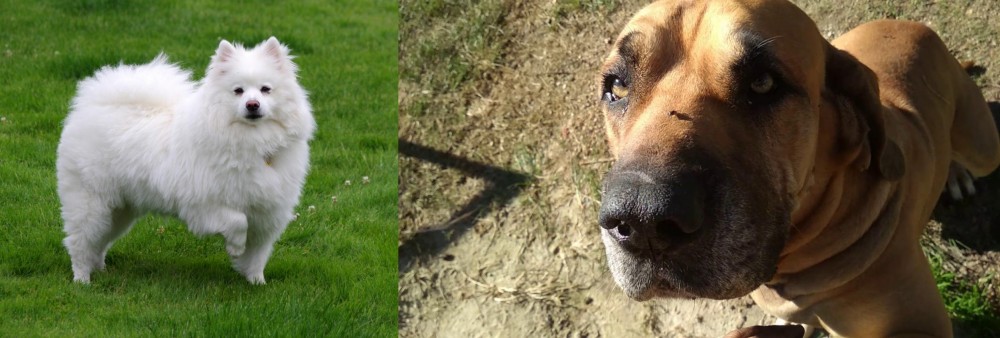 American Eskimo Dog is originated from United States but Cabecudo Boiadeiro is originated from Brazil. American Eskimo Dog may grow 27 cm / 10 inches shorter than Cabecudo Boiadeiro. American Eskimo Dog may weigh 66 kg / 145 pounds lesser than Cabecudo Boiadeiro. American Eskimo Dog may live 3 years more than Cabecudo Boiadeiro. American Eskimo Dog may have less litter size than Cabecudo Boiadeiro. American Eskimo Dog requires High Maintenance. But Cabecudo Boiadeiro requires Low Maintenance
American Eskimo Dog is originated from United States but Cabecudo Boiadeiro is originated from Brazil. American Eskimo Dog may grow 27 cm / 10 inches shorter than Cabecudo Boiadeiro. American Eskimo Dog may weigh 66 kg / 145 pounds lesser than Cabecudo Boiadeiro. American Eskimo Dog may live 3 years more than Cabecudo Boiadeiro. American Eskimo Dog may have less litter size than Cabecudo Boiadeiro. American Eskimo Dog requires High Maintenance. But Cabecudo Boiadeiro requires Low Maintenance
 The American Eskimo is derived from the Nordic Spitz breed and most closely related to the German Spitz in particular. There were many German Spitzes in the United States at the time of the second World War and anti-German sentiment caused its name to change to the American Eskimo Dog. However, as the breed developed over time in the States, the American Eskimo became its own separate breed. In addition to the German Spitz, the American Eskimo is also related to the white Keeshond, the Samoyed, the white Italian Spitz and the white Pomeranian.
The history is beginning to show that the Spitzes that were brought to the US in the early 1900’s was white. This color was not popular in Europe but was quickly the favorite in the United States. They were originally working dogs on farms and ranches. They have excellent herding instincts, make goo watch and guard dogs, and good law enforcement sniff dogs. However, their first introduction to the American public was through the Cooper Brothers’ Railroad Circus and Stout’s Pal Pierre at the Barnum and Baily Circus. Eskimo puppies were sold after the circus show.
The American Eskimo is derived from the Nordic Spitz breed and most closely related to the German Spitz in particular. There were many German Spitzes in the United States at the time of the second World War and anti-German sentiment caused its name to change to the American Eskimo Dog. However, as the breed developed over time in the States, the American Eskimo became its own separate breed. In addition to the German Spitz, the American Eskimo is also related to the white Keeshond, the Samoyed, the white Italian Spitz and the white Pomeranian.
The history is beginning to show that the Spitzes that were brought to the US in the early 1900’s was white. This color was not popular in Europe but was quickly the favorite in the United States. They were originally working dogs on farms and ranches. They have excellent herding instincts, make goo watch and guard dogs, and good law enforcement sniff dogs. However, their first introduction to the American public was through the Cooper Brothers’ Railroad Circus and Stout’s Pal Pierre at the Barnum and Baily Circus. Eskimo puppies were sold after the circus show.
It was then that the breed became one of America’s favorite breeds and they quickly became house pets. Following World War II, Japan exported the Japanese Spitz into America and it was crossed with the Eskimo also. The American Eskimo Dog breed was not recognized by AKC until 1985. Still in 1958 there was no official breed club in the States but there were growing numbers of the dogs. It was not until 1970 did the National American Eskimo Dog Association (NAEDA) come into being. They collected the pedigrees of the first 1750 dogs to be AKC registered.
Since the American Eskimo Dog is not recognized internationally, those wishing to participate in international competition such as England’s prestigious Cruft’s Dog Show must register their dogs a German Spitz. Despite this the American Eskimo and German Spitz remain two very different breeds.
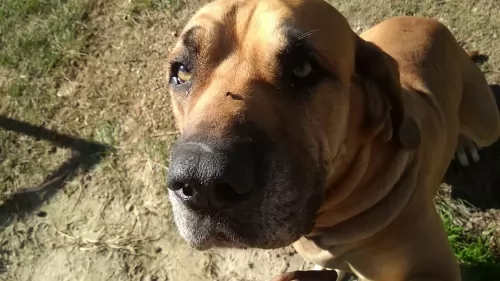 The Cabecudo Boiadeiro has always played an important role in the management of livestock. Stockdogs like this were known in parts of Minas Gerais as early as the 18th century. In fact reports tell us that the Cabecudo has existed since the 16th century as a working dog in the rural parts of Brazil.
The Cabecudo Boiadeiro has always played an important role in the management of livestock. Stockdogs like this were known in parts of Minas Gerais as early as the 18th century. In fact reports tell us that the Cabecudo has existed since the 16th century as a working dog in the rural parts of Brazil.
The Capecudo has remained much the same over the centuries – a dog created as a guardian for large properties, as a game hunter and livestock herder and protector. Today this Molosser dog still drives cattle in Brazil.
 This small to medium dog is beautiful and resembles a miniature Samoyed. There are three sizes of American Eskimo – the standard, miniature, and the toy. The Eskimo’s head is wedge shaped with tall, triangular, erect ears. It has a heavily plumed tail with a sharp curl over the back. The Eskimo can burst into bold action due to their good legs and feet.
This small to medium dog is beautiful and resembles a miniature Samoyed. There are three sizes of American Eskimo – the standard, miniature, and the toy. The Eskimo’s head is wedge shaped with tall, triangular, erect ears. It has a heavily plumed tail with a sharp curl over the back. The Eskimo can burst into bold action due to their good legs and feet.
The coat is a double one with a harsh outer coat and plush inner one. The coat is always white or white with cream or biscuit markings, and visible skin in gray or pink. The American Eskimo’s ruff or mane is very heavy, and the nose, eyelids, pads and gums are black. They have dark eyes and blue are not allowed.
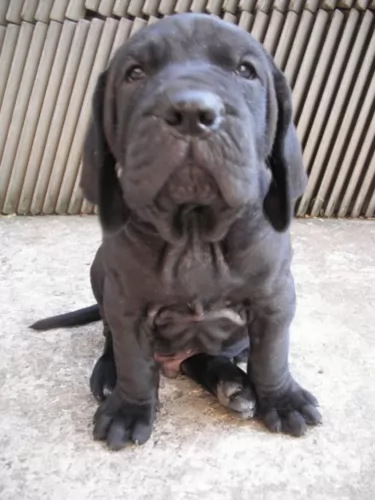 The Brazilian Cabedudo is a strong boned, large dog with a large head and a deep chest. The coat of the dog is short and dense and in wheat-colored shades or fawn shades, while brindle is also in existence. The Cabeçudo Boiadeiro is also known as the Brazilian Mastiff and is a large, imposing dog.
The Brazilian Cabedudo is a strong boned, large dog with a large head and a deep chest. The coat of the dog is short and dense and in wheat-colored shades or fawn shades, while brindle is also in existence. The Cabeçudo Boiadeiro is also known as the Brazilian Mastiff and is a large, imposing dog.
Because the breed was created from a blend of the English Mastiff, the Bulldog and the Bloodhound, not only is this a large dog in height, but a big boned dog as well. He has short to medium length floppy ears and a long tail.
The Brazilian Cabedudo is a courageous dog. When he has been properly trained and socialized, this large dog is capable of becoming an obedient, loving and devoted family pet who is able to get along with children and other pets too. He reserves this gentler side of him for his human family and won’t easily tolerate strangers.
 The Eskimo is affectionate, playful and love children of all ages. They are intelligent and want to please you. They can be trained easily and are champions of the obedience trial. They are fun and confident. At the same time, they need a confident pack leader. He is prone to Little Dog Syndrome where the dog thinks they oversee the home and display all sorts of behaviors. Under these circumstances the American Eskimo can become obsessive, aggressive, and engaging in obsessive resource guarding and barking.
The Eskimo is affectionate, playful and love children of all ages. They are intelligent and want to please you. They can be trained easily and are champions of the obedience trial. They are fun and confident. At the same time, they need a confident pack leader. He is prone to Little Dog Syndrome where the dog thinks they oversee the home and display all sorts of behaviors. Under these circumstances the American Eskimo can become obsessive, aggressive, and engaging in obsessive resource guarding and barking.
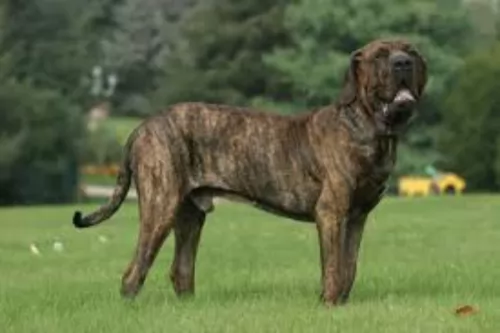 Deciding to become an owner of a dog is a big responsibility, as you are going to have your pet with you for 10 – 15 years at least. There are so many essentials to remember with owning a dog and most dogs are far happier and healthier when allowed to live part of the time indoors with their human family.
Deciding to become an owner of a dog is a big responsibility, as you are going to have your pet with you for 10 – 15 years at least. There are so many essentials to remember with owning a dog and most dogs are far happier and healthier when allowed to live part of the time indoors with their human family.
It's not always easy being a large dog such as the Cabecudo Boiadeiro, as people often assume these mastiff-type dogs are unfriendly and aggressive.
Every dog breed however, is essentially the product of his owners lifestyle and his unique upbringing with them. When this large pet is properly trained and socialized and he is loved and well cared for, he promises to be faithful, devoted, playful and loving – a real friend and protector.
 The American Eskimo Dog is prone to hip dysplasia. Their eyes and tear ducts are potential issues with progressive retinal atrophy. They are allergic to fleas and have a tendency to be overweight.
The American Eskimo Dog is prone to hip dysplasia. Their eyes and tear ducts are potential issues with progressive retinal atrophy. They are allergic to fleas and have a tendency to be overweight.
We deal with PRA (Progressive Retinal Atrophy) in greater detain in a following section but it is not as destructive as it used to be. It is much more treatable now.
There are potentially some dental issues that some American Eskimo Dogs are prone to.
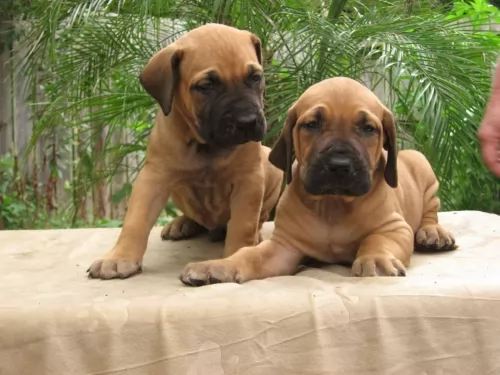 The Cabecudo Boiadeiro is considered a robust breed, used to lots of exercise while herding livestock. With good care and plenty of exercise he can live to 10, 11 or 12 years of age. He is a large breed and this fact alone will ensure that you be aware of some dog illnesses prone to larger breeds.
The Cabecudo Boiadeiro is considered a robust breed, used to lots of exercise while herding livestock. With good care and plenty of exercise he can live to 10, 11 or 12 years of age. He is a large breed and this fact alone will ensure that you be aware of some dog illnesses prone to larger breeds.
This is an orthopedic condition where the hip joints don’t fit properly into the hip joint. Larger breeds such as the Cabecudo Boiadeiro are at a higher risk of getting this orthopaedic disorder.
You’ll see your dog battling to move around and he may not even be able to get up again after lying down. Sometimes a dog might even require surgery. Thankfully, there is testing for hip dysplasia in dogs, and you can ask to see a clearance certificate if you buy your puppy from a so-called reputable breeder.
Progressive retinal atrophy (PRA) is a degenerative eye disorder that can actually lead to blindness in your pet. Night blindness sets in and your dog becomes unsure how to walk in unfamiliar areas, You'll notice that his eyes become gray or cloudy-looking as though there is a film over the eyes. Parent dogs with this eye disease should be spayed or neutered.
 Your American Eskimo Dog needs a high quality food so they will not get overweight. Make sure you know how much is appropriate for your particular dog and her specific age. The puppies should be fed twice a day but adults only once.
Your American Eskimo Dog needs a high quality food so they will not get overweight. Make sure you know how much is appropriate for your particular dog and her specific age. The puppies should be fed twice a day but adults only once.
As previously mentioned the American Eskimo Dog is prone to eye issue such as Progressive Retinal Atrophy or (PRA) – this disease is inherited and used to cause blindness as the rods in the retina died. New medical discoveries mean this is no longer a hopeless disease. Their eyes are also susceptible to other issues so make sure you check them and the tear ducts regularly.
Like so many other breeds the American Eskimo is also susceptible to hip dysplasia and a moving patella in the knee. For this reason watch their weight. They can also be very allergic.
This small dog has more energy than his size can handle. He needs a lot of exercise and a place to run. If he will become hyperactive and destructive. They are prone to disturbing behaviors such as spinning (spinning in circles) when they don’t get enough exercise. The American Eskimo Dog is smart and agile, Play games like catch or agility. They are also great at herding, competitive obedience or detection.
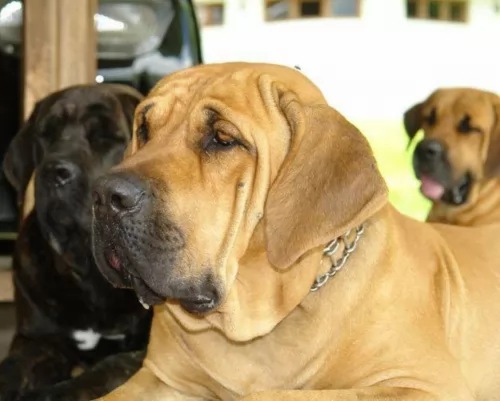 The Cabecudo Boiadeiro is a large breed dog. In spite of his size though, he is surprisingly an active dog. He will need regular exercise such as a brisk walk very day. You can also put aside time to give him some exciting ball games. He is a breed used to working so he will be most unhappy lying around doing nothing.
The Cabecudo Boiadeiro is a large breed dog. In spite of his size though, he is surprisingly an active dog. He will need regular exercise such as a brisk walk very day. You can also put aside time to give him some exciting ball games. He is a breed used to working so he will be most unhappy lying around doing nothing.
If you are going to be feeding your Cabecudo Boiadeiro commercially manufactured good, make sure it is the best quality food. Always go for dog foods which have all the nutrients your large dog requires.
You get wet, dry and raw complete foods and you can give your pet a mix of these. Always make sure that your pet gets some raw meat in from time to time too, otherwise he could battle with skin diseases.
If you aren’t sure how to feed such a large dog, your veterinarian will help you decide which category of food would suit your pet. Clean, cool water is to be provided constantly.